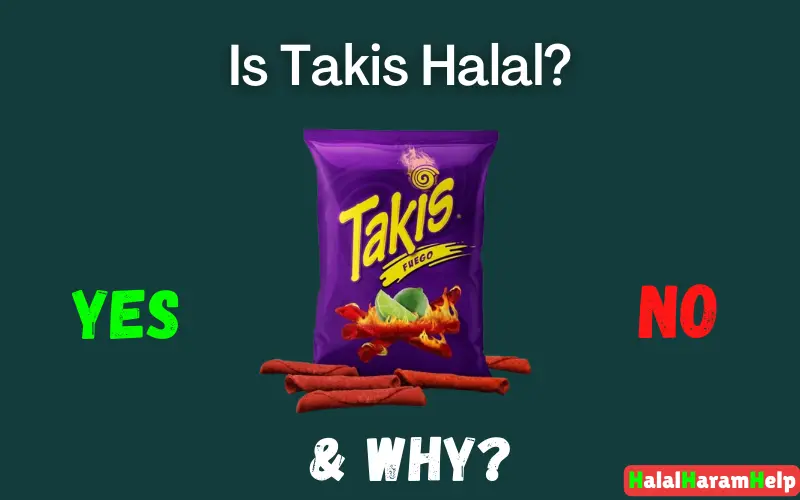The spicy and tangy flavors of Takis have captured the taste buds of snack lovers worldwide.
However, for those who adhere to halal dietary guidelines, the question arises, is Takis halal?
Understanding the halal status of this popular snack is essential for informed consumption.
While Takis are not certified halal by any Islamic organizations, it’s crucial to delve deeper into the ingredients and manufacturing processes to determine if they align with halal standards.
Keep reading as we explore the complexities and provide clarity on whether Takis can be considered a halal-friendly snack.

Is Takis Halal?
The halal status of Takis is not clear-cut. While they are a favorite snack for many, Takis are not certified halal by any Islamic organizations, which means they cannot be considered 100% halal.
Furthermore, the company that makes Takis, Barcel, has stated that their products are not halal certified and they do not claim to be halal.
They also mentioned that although they don’t use haram drinks or pork gelatin as ingredients, the use of animal-based enzymes poses a concern for halal consumers.
Due to many conflicts even knowing all the ingredients we can’t claim Takis to be halal. This is because even after questioning the brand for halal status they claim many things but to be halal friendly. So it’s better to avoid it.
If you’re still looking for more information keep reading.
You might also like to know are Red Doritos halal.
Ingredients Used In Takis
Understanding the ingredients in Takis is crucial to assessing their halal status. Here’s a breakdown of the typical ingredients found in Takis:
1. Corn Masa Flour: This is a type of flour made from dried masa, which is dough made from treated corn. It is generally halal as it is purely plant-based.
2. Vegetable Oil (Palm Oil and/or Soybean Oil): These oils are derived from plants and are considered halal.
3. Seasoning: This includes a variety of components:
Maltodextrin:
Salt: A mineral, always halal.
Citric Acid: A natural preservative and flavor enhancer derived from citrus fruits, considered halal.
Sugar: A sweetener derived from sugar cane or sugar beets, considered halal.
Monosodium Glutamate (MSG): A flavor enhancer, considered halal.
Hydrolyzed Soy Protein: Protein derived from soybeans, generally halal.
Yeast Extract: A flavor enhancer derived from yeast, considered halal.
Artificial Color (Red 40 Lake, Yellow 6 Lake): Synthetic colors that are typically considered halal.
Vegetable Oil (Canola and/or Soybean Oil): Plant-based oils that are considered halal.
4. Artificial Flavors: These are chemically created flavors. They are considered halal if they don’t contain alcohol or other non-halal substances.
5. Sodium Bicarbonate: Also known as baking soda, this is a chemical compound used in baking, considered halal.
6. Onion Powder: A dehydrated onion product, considered halal.
7. Hydrolyzed Corn Protein: Protein derived from corn, generally considered halal.
8. Natural Flavors: These can be derived from both plant and animal sources. The halal status depends on the specific source, which is not always disclosed.
9. Disodium Inosinate and Disodium Guanylate: Flavor enhancers that are generally considered halal unless derived from non-halal sources.
10. Soybean Oil: A plant-based oil considered halal.
Animal-Based Enzymes In Takis
One of the primary concerns for halal consumers is the presence of animal-based enzymes in Takis.
These enzymes can come from non-halal sources, making the product unsuitable for strict halal diets.
Since Barcel does not specify the sources of these enzymes, the ambiguity remains a significant factor in determining the halal status.
If you like Pop Tarts, you must learn are Pop Tarts halal.
FAQs
Q1. Is Takis halal or haram?
A: Takis are not certified halal and contain animal-based enzymes from potentially non-halal sources, making them unsuitable for strict halal diets.
Q2. Are Takis 100% vegan?
A: No, Takis are not 100% vegan as they contain animal-based enzymes.
Q3. What chips are halal in Islam?
A; Halal chips are those certified by Islamic organizations or clearly state they do not contain any non-halal ingredients. Examples include some flavors of Lay’s, Pringles, and Doritos that have halal certification.
Q4. Is E631 halal for Muslims?
A: E631 (Disodium Inosinate) can be halal if derived from plant sources or fish. If derived from animal sources, its halal status depends on whether the animals were slaughtered according to Islamic guidelines.
Conclusion
I hope this article has provided clarity on the halal status of Takis.
While they lack halal certification and contain animal-based enzymes, it’s better to avoid them.
For those seeking strictly halal snacks, it’s recommended to go with certified alternatives.
Making informed choices about what we consume is essential for maintaining our religious and dietary principles. So search always for what you consume.


